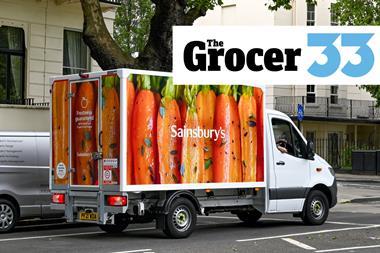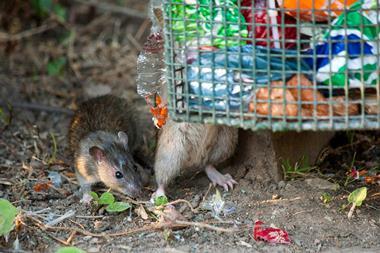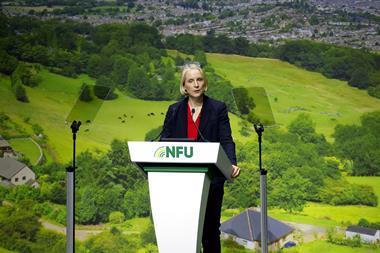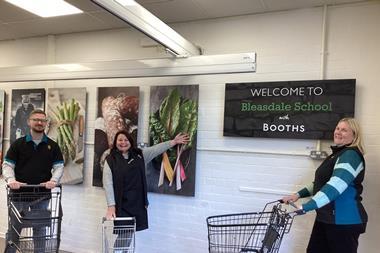"Within five to 10 years I want to be able to go into any major supermarket in 10 target countries and be confronted by an MSC certified choice that is similar to the size of choice offered by organics today.
"The MSC label is a personal choice for ethical consumers today, but should end up not a choice, because the unsustainable fisheries will have been driven off the shelf. But ultimately it is a question of how many fisheries can comply because many are not exactly in a good state. It is not all going to happen overnight."
There are now 100 products across the world carrying the label. In the UK some 5% of consumers recognise the logo according to IGD, while MORI says 30% of consumers are "active and open" to the MSC message, and 50% of consumers are open to retailer guidance in changing their attitudes towards ethical issues.
All well and good, but volume has to keep pace with consumer awareness. The MSC currently has only two large scale fisheries certified Alaskan salmon and New Zealand hoki so if it went pushing its ethos too rapidly with buyers and consumers, suppliers could all too quickly find themselves short of product.
Certification, carried out by independent bodies, is a painstaking process. May stresses the importance of this to generate absolute consumer confidence. But proper certification takes time, 18 months or more. Fisheries now undergoing certification include Alaskan pollock (40% of US fishing activity by volume), Alaska halibut and sablefish, North Sea herring, South African hake, British Columbia salmon, and South Georgia toothfish. And there are some 20 to 30 engaged in preliminary discussions or pre-assessment. "You can't say all these fisheries will pass," says May. "But there is the incentive for them to improve if they don't get through the first time. It is a matter of incentivising change. One sees a lot of stick, but you also need a carrot element."
The carrots in question are being recognised for good environmental practice by the environmental community; the commercial incentives of access to new buyers in a European market increasingly seeking to use the MSC label on products; and the added value power of the MSC marketing tool.
May, an Oxford PPE graduate born and raised in Brussels, is a political animal who, before he came to the MSC as communications director in 1998, gained experience in broadcast journalism and worked as a political advisor to MPs. At one point he seemed headed down the MP route himself. But a key theme of his today is his disgust at how little politicians achieve.
May has a phrase for today's politicians "the useless generation", inspired by a favourite book, The Greatest Generation' by Tom Brokaw about the vitality and achievement of the Americans who fought in World War Two. "Today the world is run by slightly undereducated middle managers, whether in the environment, the arts, public services. The people running the world are not running it very well. We are all too quick to accept the world the way it is. We should think for the long-term the way that generation did."
He is comforted by the way the MSC is effecting change while the politicians are not: "We have overtaken government."
And the MSC itself is a political force after all, it is all about winning the consumers' votes in a supermarket or in Little Chef, about them saying No' to unsustainable fishing practice.
The Iraq situation though depressing is helping. "At least it is mobilising people. You are seeing real engagement from people, the sort of thing we need for the conservation cause. No one can say people are indifferent. There is an awakening of the civic spirit. Politics just can't do this. Eco-labelling is a way of helping people become engaged. They can use their vote to say this is not good enough'. Though you have to make it affordable for them."
The MSC's chain of custody certification, providing traceability from boat to plate, requires all the stakeholders to go through a certification process, from the fishery to the multiple. Costs are involved, and there is a further licensing fee to use the MSC logo.
"Yes, the costs of certification have to be borne through the supply chain, and are especially carried by the processors. So you can't say that there won't be a premium," says May.
"But so far MSC products are not more expensive, and, in fact NZ, hoki has been cheaper than cod. MSC fish won't ever be unaffordable, but there has to be some premium to the fishermen, and that can be other than price, such as access to new markets. A lot of people have switched from cod to NZ hoki."
The MSC, says May, is setting the pace in terms of rigorous standards that guarantee the fish will be there to fish. He is scornful of self-interested blanket assessments of fisheries by governments or their agencies. "Standardisation of fishing standards by governments or international governmental bodies can only work if the standards are meaningful. The problem is that when intergovernmental bodies try to set standards they often end up watered down too much to be meaningful, because agreement is usually reached on the lowest common denominator.
"Corporate Social Responsibility should be horizontally applied if it is applied properly so it cannot be shelved if it is done properly. Every department should be touched by it."
May might never become an MP but this year was selected as one of the 100 distinguished Global Leaders for Tomorrow by the World Economic Forum, hailing him as one of a new generation of young environmental leaders. He's a tad embarrassed but relished attending the forum in Switzerland in January, even if he was confronted by too many representatives of the "useless generation". "I came away pessimistic, especially in the light of Iraq," says May. "But what did strike me was that more progress is being made in the corporate than the government sector, and how far behind the corporations some politicians were. The corporations were being radical and the politicians were explaining why things were not possible, with grand rhetoric but not much political will."
If May misses politics at all, he admits his current job is, if anything, more political thanks to the complex and demanding negotiations with the very different MSC stakeholders. It is now backed by a coalition of more than 100 organisations from 20 countries. It has, even at these early years, been hailed as something of a dream come true in terms of international collaboration, and at all levels of the chain. In a world of bad news about fish stocks, hope for the future.
>>p40 Saturday Essay, p64 Market Edge
{{ANALYSIS }}
"The MSC label is a personal choice for ethical consumers today, but should end up not a choice, because the unsustainable fisheries will have been driven off the shelf. But ultimately it is a question of how many fisheries can comply because many are not exactly in a good state. It is not all going to happen overnight."
There are now 100 products across the world carrying the label. In the UK some 5% of consumers recognise the logo according to IGD, while MORI says 30% of consumers are "active and open" to the MSC message, and 50% of consumers are open to retailer guidance in changing their attitudes towards ethical issues.
All well and good, but volume has to keep pace with consumer awareness. The MSC currently has only two large scale fisheries certified Alaskan salmon and New Zealand hoki so if it went pushing its ethos too rapidly with buyers and consumers, suppliers could all too quickly find themselves short of product.
Certification, carried out by independent bodies, is a painstaking process. May stresses the importance of this to generate absolute consumer confidence. But proper certification takes time, 18 months or more. Fisheries now undergoing certification include Alaskan pollock (40% of US fishing activity by volume), Alaska halibut and sablefish, North Sea herring, South African hake, British Columbia salmon, and South Georgia toothfish. And there are some 20 to 30 engaged in preliminary discussions or pre-assessment. "You can't say all these fisheries will pass," says May. "But there is the incentive for them to improve if they don't get through the first time. It is a matter of incentivising change. One sees a lot of stick, but you also need a carrot element."
The carrots in question are being recognised for good environmental practice by the environmental community; the commercial incentives of access to new buyers in a European market increasingly seeking to use the MSC label on products; and the added value power of the MSC marketing tool.
May, an Oxford PPE graduate born and raised in Brussels, is a political animal who, before he came to the MSC as communications director in 1998, gained experience in broadcast journalism and worked as a political advisor to MPs. At one point he seemed headed down the MP route himself. But a key theme of his today is his disgust at how little politicians achieve.
May has a phrase for today's politicians "the useless generation", inspired by a favourite book, The Greatest Generation' by Tom Brokaw about the vitality and achievement of the Americans who fought in World War Two. "Today the world is run by slightly undereducated middle managers, whether in the environment, the arts, public services. The people running the world are not running it very well. We are all too quick to accept the world the way it is. We should think for the long-term the way that generation did."
He is comforted by the way the MSC is effecting change while the politicians are not: "We have overtaken government."
And the MSC itself is a political force after all, it is all about winning the consumers' votes in a supermarket or in Little Chef, about them saying No' to unsustainable fishing practice.
The Iraq situation though depressing is helping. "At least it is mobilising people. You are seeing real engagement from people, the sort of thing we need for the conservation cause. No one can say people are indifferent. There is an awakening of the civic spirit. Politics just can't do this. Eco-labelling is a way of helping people become engaged. They can use their vote to say this is not good enough'. Though you have to make it affordable for them."
The MSC's chain of custody certification, providing traceability from boat to plate, requires all the stakeholders to go through a certification process, from the fishery to the multiple. Costs are involved, and there is a further licensing fee to use the MSC logo.
"Yes, the costs of certification have to be borne through the supply chain, and are especially carried by the processors. So you can't say that there won't be a premium," says May.
"But so far MSC products are not more expensive, and, in fact NZ, hoki has been cheaper than cod. MSC fish won't ever be unaffordable, but there has to be some premium to the fishermen, and that can be other than price, such as access to new markets. A lot of people have switched from cod to NZ hoki."
The MSC, says May, is setting the pace in terms of rigorous standards that guarantee the fish will be there to fish. He is scornful of self-interested blanket assessments of fisheries by governments or their agencies. "Standardisation of fishing standards by governments or international governmental bodies can only work if the standards are meaningful. The problem is that when intergovernmental bodies try to set standards they often end up watered down too much to be meaningful, because agreement is usually reached on the lowest common denominator.
"Corporate Social Responsibility should be horizontally applied if it is applied properly so it cannot be shelved if it is done properly. Every department should be touched by it."
May might never become an MP but this year was selected as one of the 100 distinguished Global Leaders for Tomorrow by the World Economic Forum, hailing him as one of a new generation of young environmental leaders. He's a tad embarrassed but relished attending the forum in Switzerland in January, even if he was confronted by too many representatives of the "useless generation". "I came away pessimistic, especially in the light of Iraq," says May. "But what did strike me was that more progress is being made in the corporate than the government sector, and how far behind the corporations some politicians were. The corporations were being radical and the politicians were explaining why things were not possible, with grand rhetoric but not much political will."
If May misses politics at all, he admits his current job is, if anything, more political thanks to the complex and demanding negotiations with the very different MSC stakeholders. It is now backed by a coalition of more than 100 organisations from 20 countries. It has, even at these early years, been hailed as something of a dream come true in terms of international collaboration, and at all levels of the chain. In a world of bad news about fish stocks, hope for the future.
>>p40 Saturday Essay, p64 Market Edge
{{ANALYSIS }}


















No comments yet